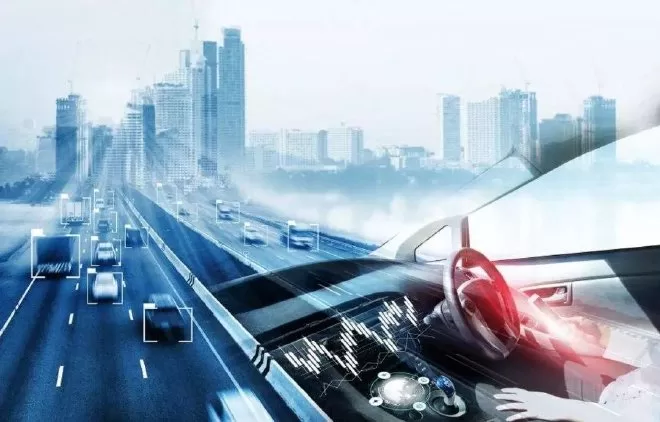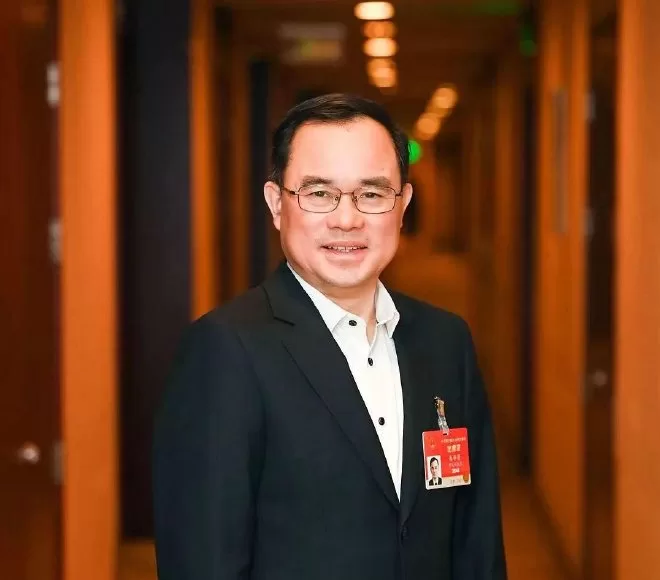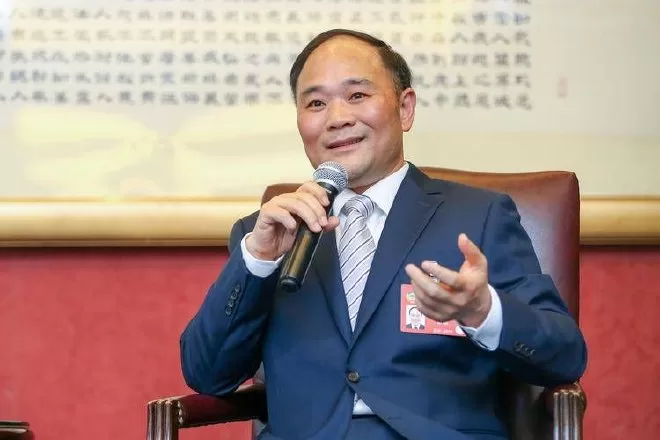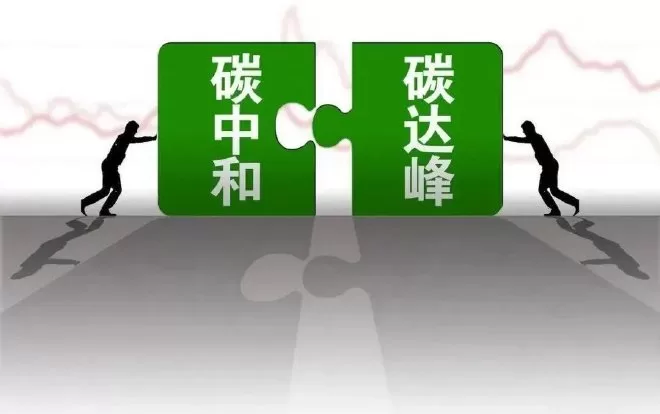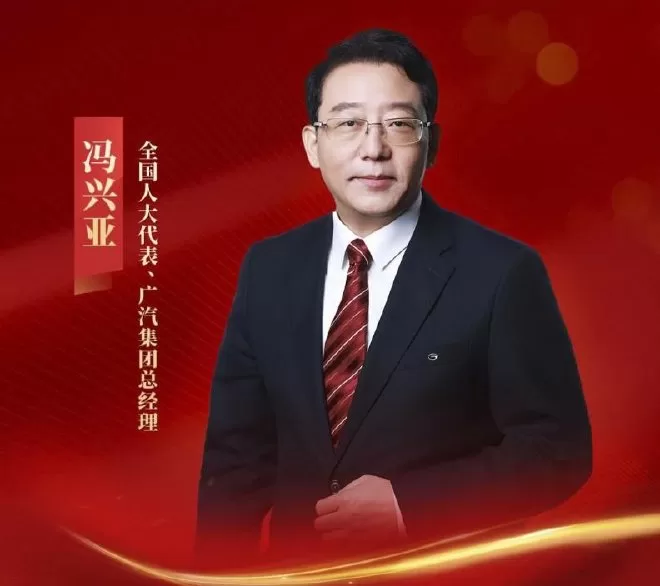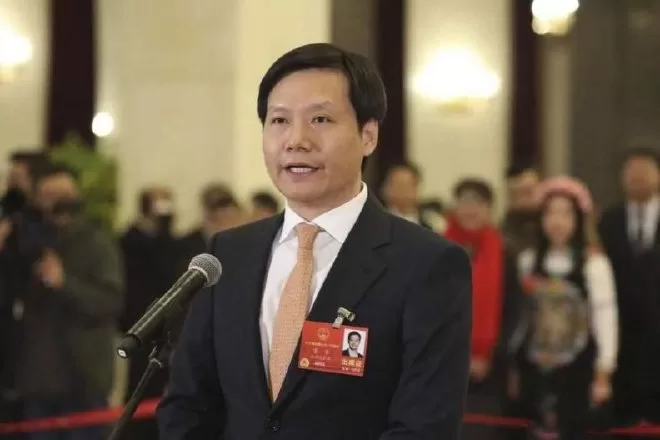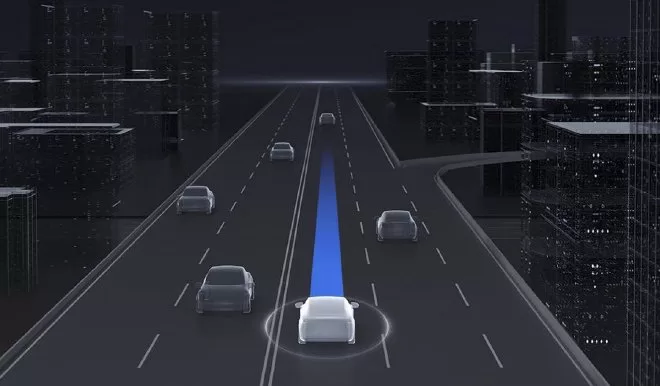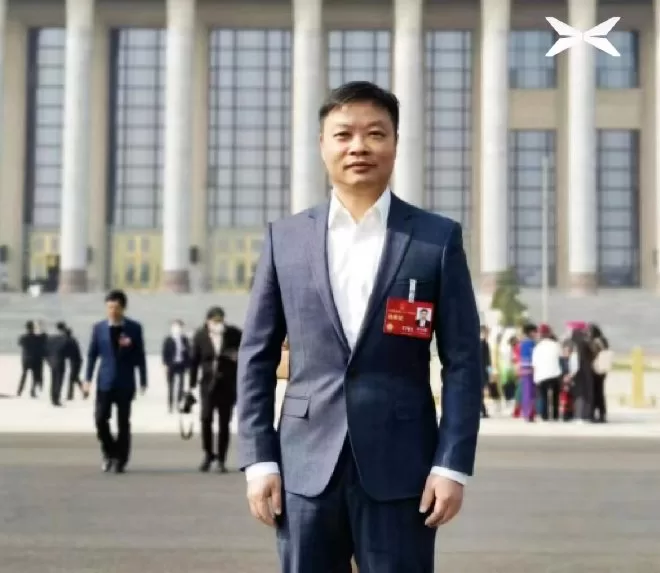The automotive industry, as an important pillar of the national economy, is closely related to the travel and life of billions of consumers. During the two sessions in 2024, the future development direction of the automotive industry has become a topic of urgent concern, and representatives of car companies have also contributed their insights into the automotive industry, which is worth our close attention. Zhu Huarong: Improve legislation on automotive data property rights During the 2024 two sessions, Zhu Huarong, a member of the National People’s Congress, secretary of the Changan Automobile Party Committee, and chairman, brought multiple suggestions, including the construction of a mixed reality large-scale scientific device for future smart transportation, improving legislation on automotive data property rights, further opening up the consumption link of the automotive industry, and optimizing automotive industry policies.
Zhu Huarong, Party Secretary and Chairman of Changan Automobile, encourages the construction of a future-oriented smart transportation mixed reality science facility. He believes that in the future smart transportation system, people, vehicles, roads, and clouds will be coupled, resulting in extremely complex traffic scenarios, malicious accidents, large-scale network intrusion, and new risks and problems. Currently, all automobile powers have built or are building future transportation mixed reality science facilities that integrate all transportation elements into the environment. However, China is still in the early stages in this field, facing many problems such as repeated construction of small and medium-sized devices, blank spaces for large devices, and high dependence on foreign suppliers for existing device hardware and software. Zhu Huarong suggests establishing an integrated research platform for industry, academia, and research to promote the construction of large science facilities. He also suggests including the project in the national key scientific and technological infrastructure plan to ensure resource input. In the “Proposal to Improve Legislation on Automobile Data Property Rights,” Zhu Huarong pointed out that the blurred boundaries of non-personal information related to intelligent connected vehicles and unclear ownership will be detrimental to the protection of personal information. This will also make it inconvenient for car companies to legally and fully process and use relevant data, which is not conducive to the development of technology and the automotive industry. Zhu Huarong suggests clearly defining the boundaries of personal information in automobile data and refining the regulations on automobile data property rights to implement the rights of car companies to hold, process, and operate automobile data. Zhu Huarong suggests further opening up the automobile industry consumption link, optimizing the automobile industry policy, encouraging market innovation, strengthening consumer experience, and improving new quality productivity. Zhu Huarong suggested implementing the electronicization of automobile consumer retail invoices, online processing of license plate applications, achieving convenient process handling, improving efficiency, and reducing costs. Additionally, he suggested reviewing and improving relevant laws and regulations, industry supervision requirements, accelerating the establishment of data circulation platforms and mechanisms, empowering enterprise innovation in consumer experience, and coordinating and improving relevant policies in the automobile industry to optimize the fair competition environment in the automobile market, promote “end-to-end” cooperation between car companies and insurance companies, reduce intermediate links, and reduce consumer insurance purchase costs. Li Shufu: Increase low-carbon development of the automobile industry. At the National Two Sessions in 2024, Li Shufu, a member of the National Committee of the Chinese People’s Political Consultative Conference and chairman of Geely Holding Group, submitted two proposals, “Proposal on Consolidating the Carbon Market Foundation and Promoting the Automobile Industry to Achieve the ‘Dual Carbon’ Goal” and “Proposal on Establishing and Implementing Barrier-Free Vehicle Standards Nationwide to Promote the Construction of Pilot Projects,” covering hot topics such as carbon footprint of automobile products, new energy vehicle credit pools and carbon emission reduction, and vehicles for the elderly and disabled. Against the backdrop of “dual carbon,” low-carbon development in the entire vehicle and parts sector has become the focus of attention for members. Li Shufu believes that the automotive industry, as an important pillar of the national economy, has a long industrial chain, high degree of relevance, and strong driving force. It should fully play the role of “long chain” and guide the continuous and effective carbon reduction of the upstream and downstream industrial chains, leading the way in achieving the “dual carbon” goal.
Geely Holding Group Chairman Li Shufu Li Shufu pointed out that China’s automotive products have obvious “low-carbon” advantages, but due to the gradual approach of international “carbon barriers,” the EU, the United States, and other places have successively introduced a series of policies such as “anti-subsidy” and “carbon tariffs,” making it more difficult to achieve international recognition in the short term. In addition, the current “Management Measures for the Average Fuel Consumption of Passenger Vehicle Enterprises and the Parallel Management of New Energy Vehicle Points” cannot be directly connected to the carbon emission system; the cost and difficulty of promoting carbon reduction are high; and the digital management of carbon emissions is decentralized. Therefore, the “low-carbon” development of the automotive industry still needs policy support and guidance. In this regard, Li Shufu proposed four suggestions: First, establish a unified product carbon footprint management system for the automotive industry and promote the international recognition of automotive product carbon footprints. He stated that according to the opinions jointly issued by the National Development and Reform Commission and other departments in November 2023 on accelerating the establishment of a product carbon footprint management system, it mentioned that by 2025, the country will introduce around 50 key product carbon footprint accounting rules and standards, achieving international recognition. In Li Shufu’s view, China has become the world’s largest exporter of automotive products, and at the current stage, the advantages of new energy vehicle products are obvious. In order to further expand the export advantage of automotive products and address the carbon trade barriers of European and American countries, automotive products urgently need to become one of the products covered by the carbon footprint accounting rules and standards to be introduced in 2025. Second, prioritize the promotion of the connection mechanism between the “point method” and the carbon reduction system. He suggested that the interests of enterprises participating in the construction of the “point pool” should be considered overall, and the “positive points” in the “point pool” should be reasonably converted into automotive carbon emission points or carbon quotas, allowing enterprises with insufficient emission reductions to purchase carbon points from excellent emission reduction enterprises, promoting the industry to more actively promote emission reduction and carbon reduction. Third, accelerate the introduction of support policies for key industries to reduce carbon emissions, promote the construction of a national carbon market, and promote planned carbon reduction by enterprises through market mechanisms.
Li Shufu suggested expanding the scope of industry inclusion, the types of carbon trading products, and the range of participants in the carbon market, and timely opening up individual participation in carbon trading. At the same time, continuously improve the green finance framework, make good use of financial tools, and support key industries in raising funds for low-carbon transformation actions. The fourth is to strengthen the standardized management of digital carbon management tools. Li Shufu suggested that industry regulatory authorities should issue construction standards and supervision mechanisms for the digital carbon management platform of this industry, strengthen the construction of the data quality measurement guarantee system of the carbon management platform, strengthen the full-process information collection and information disclosure of the platform, and continuously improve the reliability, timeliness, and standardization of platform data monitoring, collection, storage, accounting, and verification. Feng Xingya: Speed up the optimization of export support policies Feng Xingya, a member of the National People’s Congress and general manager of GAC Group, spoke out for the automobile industry at the 2024 National Two Sessions with five proposals and one motion, focusing mainly on the pain points of the automobile industry’s new energy transformation, intelligentization, and international development, and offering suggestions for the high-quality development of the automobile industry.
Guangqi Group General Manager Feng Xingya First, further improve the policies related to automobile exports. With the wave of electrification and intelligence, the core competitiveness of Chinese automobile brands continues to increase, and actively expands into overseas markets. Although automobile exports have become an important engine driving the growth of automobile production and sales, due to the acceleration of overseas brands and complex business environments, automobile exports still face tremendous pressure and urgently need national assistance. In this regard, Feng Xingya proposed promoting international cooperation in the industry, coordinating common export issues, optimizing export supervision mechanisms, and strengthening information and transportation construction, and taking multiple measures to escort the high-quality development of going overseas. Second, promote and support the development of energy-saving vehicles. Due to the rapid development of new energy vehicles, the attention to fuel vehicles has decreased in recent years. Feng Xingya believes that the role of energy-saving vehicles in achieving the “dual carbon” target cannot be ignored. From the perspective of market development, for a considerable period of time, fuel vehicles will still be the mainstream of the automobile market. In addition, for the overall national energy strategy, there is a risk of excessive dependence on a single energy route in the automobile industry, and energy-saving vehicles serve as a supplement to new energy vehicles. Therefore, Feng Xingya suggested to promptly introduce medium and long-term special plans and support policies for energy-saving vehicles, improve supporting measures such as taxation and purchase restrictions, increase positive guidance, and enhance the social acceptance of energy-saving vehicles. Third, accelerate the promotion of standardization of power batteries for new energy vehicles. The development of power batteries is crucial for the electrification transformation of the automobile industry. However, the power battery industry currently faces problems such as insufficient standardization, leading to increased R&D costs, difficulties in industry chain coordination, resource waste, and a decrease in international market competitiveness.
Therefore, Feng Xingya proposed unified high-power charging and swapping standards, explored the establishment of a comprehensive solid-state battery standard system, and promoted the healthy development of the domestic key car-grade chip industry. Currently, the bottleneck problem of domestic chips has not been completely solved, which has become an important factor affecting the healthy development of the automobile industry. At this year’s two sessions, Feng Xingya also proposed suggestions to address the shortcomings in domestic car chip design technology, the overall lag in core manufacturing, insufficient chip application coverage, and an incomplete chip application ecosystem, demonstrating a high level of attention to the localization of chip applications. Accelerating the promotion of the integration of new energy vehicles and the power grid. Feng Xingya proposed suggestions to address the imperfect vehicle-grid interaction technology and standards, immature electricity spot market, and insufficient scale demonstration effects. Focusing on the focus of the second half of the automotive industry’s transformation towards intelligence, Feng Xingya also submitted proposals to revise relevant provisions of the “Road Traffic Safety Law” and clarify the legal responsibility for intelligent driving, urging to accelerate the high-quality development of intelligent vehicles from the legislative aspect. Lei Jun: Focusing on artificial intelligence and green low-carbon supply chain At the 2024 two sessions, Lei Jun, a member of the National People’s Congress and the founder, chairman, and CEO of Xiaomi Group, submitted four proposals to the conference focusing on intelligence and low-carbon.
Lei Jun, Founder, Chairman, and CEO of Xiaomi Group First, as the world accelerates towards the carbon-neutral era, international green trade barriers are gradually emerging. Lei Jun suggested accelerating the establishment of a manufacturing carbon footprint database, promoting international connection and mutual recognition; supporting the creation of a green digital supply chain system, achieving collaborative connectivity within the supply chain; exploring the establishment of a national green electricity trading mechanism to promote leading enterprises in the supply chain to lead the green transformation of the supply chain. Second, with the current surge in artificial intelligence sparking a new round of technological change, the long-term trend shows a sharp increase in the demand for manpower with basic artificial intelligence skills in various industries. Strengthening the training of talent in the field of artificial intelligence will become a key factor in the sustained upgrading of our country’s industries. In response, Lei Jun suggested incorporating artificial intelligence into the education and training system. On the one hand, popularize artificial intelligence literacy education at the compulsory education stage, set up artificial intelligence general education courses in the nine-year compulsory education stage, and incorporate relevant content into social practice activities in primary and secondary schools; on the other hand, vigorously promote the construction of artificial intelligence-related majors in universities, increase investment in the construction of artificial intelligence disciplines in universities, strengthen cooperation and exchange with world-class research institutions, expand teaching resources, and cultivate comprehensive talents integrating theory and practice. In addition, Lei Jun also proposed encouraging large technology companies and social education and training institutions to carry out applied talent training in the field of artificial intelligence to adapt to the rapid iteration of technology, the large demand for talent, and the wide application of artificial intelligence. Third, at present, China’s intelligent driving industry is developing rapidly, and artificial intelligence technology is widely used in the automotive industry. At the same time, relevant national departments have successively issued policies and are actively promoting the formulation and revision of intelligent driving related regulations and standards, as well as researching and formulating supporting methods for the supervision and management of intelligent driving products. However, at present, there are still significant differences in the functional definition, safety intelligence, human-computer interaction, and data application of intelligent driving products in the automotive industry, posing risks to driving safety and data security. Therefore, Lei Jun suggested standardizing the application of assisted driving functions, accelerating the application of safety technology requirements and testing and verification standards for assisted driving, refining the human-computer interaction requirements for drivers in various environments and risk reminders, and creating a safe driving experience.
1. The level of intelligent driving safety depends on the feedback of real data from the vehicle and the road. It is necessary to standardize the use of vehicle data and to establish detailed regulations for the compliance measures and product standards of intelligent driving data collection, storage, and use by relevant departments. At the same time, a unified intelligent driving safety monitoring data platform should be established to improve the safety level of intelligent driving products. 2. For the solution of valet parking, Lei Jun suggested further promoting the application of autonomous valet parking function definitions and technical requirements related to regulatory standards, to ensure the safety of unmanned scenarios and promote the large-scale application of safe and reliable autonomous valet parking functions. 3. Fourth, intelligent manufacturing has become an important engine for the optimization and upgrading of traditional industries and the cultivation and growth of emerging industries in China. Lei Jun stated that there are currently problems with the lack of coordination and collaboration in standardizing intelligent manufacturing, the need to improve the level of application and promotion, and the restrictions on key technological equipment. 4. Lei Jun suggested that first, it is necessary to promote the integration and innovation of advanced intelligent technology with the manufacturing industry and accelerate the large-scale deployment of industrial models. Second, it is important to improve the construction of the standard system and explore the “Chinese paradigm” of intelligent manufacturing. In addition, support should be provided to leading enterprises to undertake major projects in intelligent manufacturing and tackle key technological equipment. 5. He Xiaopeng: Promoting the application of flying cars Xiaopeng Motors Chairman and CEO He Xiaopeng proposed two suggestions: “Exploring limited-scene unmanned driving regulations to accelerate the integration and interaction of new energy vehicles with the power grid” and “Promoting the application of flying cars to assist in the development of new productive forces in the low-altitude economy.”
He Xiaopeng, chairman and CEO of Xiaopeng Motors, suggests exploring policies and regulations for low-speed unmanned driving in limited scenarios, and conducting pilot applications of nighttime low-speed unmanned driving + energy supplementation to achieve the transition from “people looking for charging stations” to “cars looking for charging stations”. He also recommends shifting the electricity load from daytime peak periods to nighttime off-peak periods and transforming charging from an active behavior to automated roaming services. Currently, the development of vehicle networking interaction is slow, with many bottlenecks, mainly due to a lack of clear business models and related technical standards. He Xiaopeng suggests promoting the top-level design of vehicle networking interaction, building mature business models, unifying relevant standards, exploring more application scenarios, and accelerating market promotion. Regarding flying cars, He Xiaopeng believes that as an advanced intelligent transportation tool, it is becoming a hot spot for innovation and technology in countries such as China, the United States, Japan, and Europe, and has entered a period of explosive development. China is at the forefront of the world in the research and development of amphibious flying cars, and the prospects for the development of low-altitude economy are broad.
He Xiaopeng proposed three suggestions: First, accelerate the top-level design and strategic planning of the flying car industry, and make forward-looking top-level planning in product management, product certification, and standard system design, clarify the top-level planning for flying car certification, increase the input of approval resources, and form a product approval path that can be implemented in stages; Second, around the large-scale application of flying cars, build a perfect related operation system, support the large-scale application of products from multiple aspects such as driver qualification, airspace, and operation management, including establishing a flying car driver qualification certification and training system; accelerate the opening of low-altitude airspace, improve the utilization of airspace resources; establish a unified supervision and command platform and low-altitude airspace management system. Third, referring to the development experience of the new energy vehicle industry policy, formulate policy planning for the development of the flying car industry, and introduce supporting implementation plans to promote the rapid development of the flying car industry. In summary, the suggestions made by the representatives of the car companies focus on the low-carbon development in the whole vehicle and parts field, and the automobile industry has also begun to focus on high-quality development and enhance market competitiveness. In addition, in the field of intelligent driving, the industry is looking forward to the application prospects of large models in the field of autonomous driving, and also needs to accelerate the legislative process of autonomous driving to regulate the healthy development of the automobile industry.
